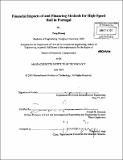Financial impacts of and financing methods for high-speed rail in Portugal
Author(s)
Huang, Teng, S.M. Massachusetts Institute of Technology
DownloadFull printable version (20.32Mb)
Other Contributors
Massachusetts Institute of Technology. Dept. of Civil and Environmental Engineering.
Advisor
Joseph M. Sussman.
Terms of use
Metadata
Show full item recordAbstract
High-speed rail (HSR) becomes a very hot topic recently when all Portugal, the United Stated, China, Japan, Spain, etc. are ambitious in building their HSR systems. Although HSR is expected to shrink the temporal distance between cities, reshape the travel patterns of people toward environment friendly ones, create an image effect for the country building it, promote regional economics, etc., HSR is more capital intensive than other transportation projects in both unit cost (the cost per lane km) and total cost. Due to its high costs and public or private budget constraints, HSR may have significant financial impacts on other transportation investments. And it is important to lower the costs of HSR building and explore more funding opportunities to make HSR investments more financially viable. This research aims to understand the financial impacts of HSR investments and to explore financing methods for them. Firstly, this research examines the crowding out effect of HSR investments on other transportation investments-whether financing HSR makes the funds for other transportation projects less available due to public or private budget constraints. In addition, this research compares HSR financing with the financing of other transportation projects to figure out the uniqueness of HSR financing. Finally, this research explores innovative financing methods and identifies megaregion revenues to make HSR investments more financially viable. We find that HSR investments crowd out other transportation investments based on the worldwide experience. In the end, we propose the use of monoline wrapped bonds and the establishment of Portuguese infrastructure bank to lower the financial costs of Portuguese HSR investments. And we recommend the use of value capture mechanisms to capture the megaregion economic benefits of HSR and gain additional revenues for Portuguese HSR investments.
Description
Thesis (S.M. in Transportation)--Massachusetts Institute of Technology, Dept. of Civil and Environmental Engineering, 2011. Cataloged from PDF version of thesis. Includes bibliographical references (p. 178-188).
Date issued
2011Department
Massachusetts Institute of Technology. Department of Civil and Environmental EngineeringPublisher
Massachusetts Institute of Technology
Keywords
Civil and Environmental Engineering.